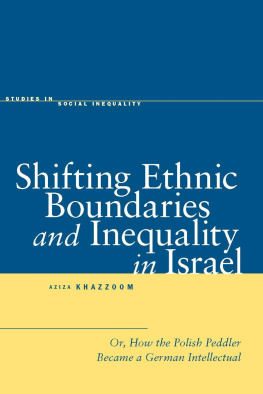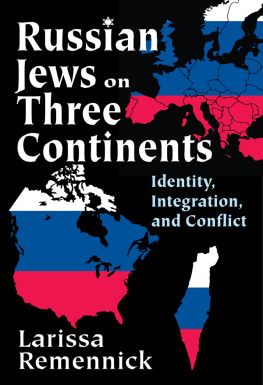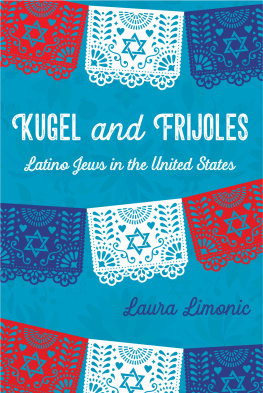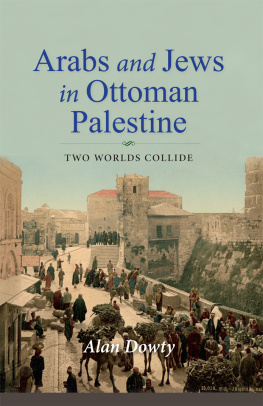STUDIES IN
SOCIAL INEQUALITY
EDITORS
David B. Grusky, STANFORD UNIVERSITY
Paula England, STANFORD UNIVERSITY
EDITORIAL BOARD
Hans-Peter Blossfeld
Mary C. Brinton
Thomas DiPrete
Michael Hout
Andrew Walder
Mary Waters

Stanford University Press
Stanford, California
2008 by the Board of Trustees of the Leland Stanford
Junior University. All rights reserved.
No part of this book may be reproduced or transmitted in any form or by any means, electronic or mechanical, including photocopying and recording, or in any information storage or retrieval system without the prior written permission of Stanford University Press.
Printed in the United States of America on acid-free, archival-quality paper
Library of Congress Cataloging-in-Publication Data
Khazzoom, Aziza.
Shifting ethnic boundaries and inequality in Israel : or, how the Polish peddler became a German intellectual /
Aziza Khazzoom.
p. cm.
Includes bibliographical references and index.
9780804779579
1. National characteristics, Israeli. 2. JewsIsraelIdentity. 3. Jews, OrientalIsrael. 4. EthnicityIsrael. 5. MulticulturalismIsrael. 6. IsraelEthnic relations. I. Title.
DS113.3.K43 2007
305.80095694--dc22
2007019278
Typeset by Newgen in 10/14 Sabon
To my father, J. Daniel Khazzoom
ACKNOWLEDGMENTS
This book would not be the same without the contributions of a few key people. Mike Hout, my dissertation advisor, always saw the big picture, and even his strongest critiques left me encouraged. Ruth Milkmans, Michael Shalevs, and Gershon Shafirs friendship and practical advice were invaluable, and I thank Michael for long talks, well into the night, about the nature of labor markets, dichotomization theory in Israel, and every other subtopic in this book.
Yossi Shavit first piqued my interest in ethnic inequality in Israel and in questions about why groups engage in social closure. Iona Mara Drita took my first attempt at a dissertation proposal, turned it inside out, and made it much clearer. Michal Frenkel greets all of my work with a healthy combination of belief and skepticism and is always available to make incisive comments on drafts. Gil Eyal and Yehouda Shenhav, whose takes on the same issue are quite different from mine, have been providing stimulating conversation for years, and there is more to get out of the differences in our three books. These people are all friends, and I am delighted to have their stamp on my work.
Other people also made important contributions to my thinking. In its stage as a dissertation the work benefited from Nancy Chodorows and Sam Lucass careful comments, and from David Biales guidance. At Tel Aviv University, Noah Lewin-Epstein, Ofra Goldstein Gidoni, Tally Katz, Hana Herzog, Henriette Dahan Kalev, Debbie Bernstein, Esther Meir-Glizenstein, and Yinon Cohen all provided critical assistance at one point or another, and I benefited from exposure to the work of Avraham Yogev, Hanna Ayalon, and Ronen Shamir. At UCLA, some of my better arguments emerged from conversations with Roger Waldinger. Adrian Favell, Manny Scheglof, and David Lopez contributed at key points in the development of my arguments, and I benefited a great deal from exposure to Min Zhous work and practice. In a few cases what I wrote is different from what these individuals would have written themselves, and I take final responsibility for any of the arguments made.
I thank my family: my father for his careful, logical mind, my mother for her imagination, my sister for her arm, and my partner for her strength and quiet spirit.
Not all the contributors to this book were people; it was also written with the help of several grants, including an NSF doctoral dissertation grant, a UCBerkeley Chancellors dissertation writing fellowship, a postdoctoral fellowship from Tel Aviv University, and a Fleg fellowship from Hebrew University.
Finally, I would like to acknowledge the subjects of this study. Although this book is not based on interview data, strangers in Israel often have conversations with each other in the course of daily life. This enabled me to meet many immigrants who were the focus of my work and to hear their individual takes on the formation of ethnic inequality. Some of the insights in this study resulted from these conversations, and I am grateful to these individuals for their input. But more importantly, these conversations reminded me that the people I studied had left their worlds behind in the hope of building a better one. This book is a critique of what they built; I hope it is a respectful and a useful one.
CHAPTER ONE
Introduction
The 1950s were a time of social fluidity in Israel. Before the state was established in 1948, the Jewish population in the area numbered about 600,000, and the non-Jewish close to 900,000. During the war that surrounded statehood, the indigenous Muslim population was reduced to about a fifth of its original size. Then, over the next ten years, nearly a million Jewish immigrants arrived from more than twenty different countries, nearly tripling the Jewish population. This all occurred as the protostate institutions that Jews and others established before independence were transformed into full-fledged institutions capable of self-government and as the economy grew rapidly. In other words, for better or for worse (depending on ones politics), what emerged was as close to a new society as sociologists can hope to find.
This book focuses on the labor market experiences of the new Jewish arrivals. Initially, they were a diverse group. From each country of origin, peddlers immigrated with professors, the unschooled with the well-educated; quite literally, a number of separate, independent stratification systems were mixed together in Israels dynamic environment. However, despite this heterogeneity, the Jewish sector that emerged was divided into two groups: easterners from Muslim countries,
As in most modern industrialized societies, these economic disparities have proven to be stable over time (Shavit et al 1998; Cohen et al 1998). But unlike most, it is possible in Israel to locate a historical period in which ethnic diversity in class position was transformed into an entrenched ethnic hierarchy. This is important because pinpointing the sources of ethnic inequality is difficult in stable, established societies. Forms of power and advantageeconomic, political, and culturalconverge over time, as particular groups establish dominance over resources. When class and ethnicity are enmeshed, the observed impact of ethnicity on success is not necessarily an indication of its real importance. Thus, even when it can be shown that ethnic inequality is reproduced largely through class factors (e.g., Hout 1984, Farkas et al., 1997), sociologists are in dispute over the meaning of these findings. Some, such as Wilson (1980, 1987) on the U.S. case, argue that the prominence of class demonstrates that racial/ethnic discrimination in the labor market is no longer an important determinant of life chances. Others, such as Parkin (1979), posit dynamics that allow ethnic elites to capitalize on the prior association between class and ethnicity to disguise ethnic discrimination as a class-based outcome. Concern over this issue extends far beyond academic circles. From the publication of The Bell Curve (1994) to the debate over affirmative action, the question of whether ethnic discrimination has simply gone underground continues to shape social policy and spark debate. By studying an ethnically stratified modern industrialized society at its formation, before class and ethnicity were fully enmeshed, we can consider ethnicity as an axis for social closure, less encumbered by preexisting race/class correlations or institutionalization of advantage.








